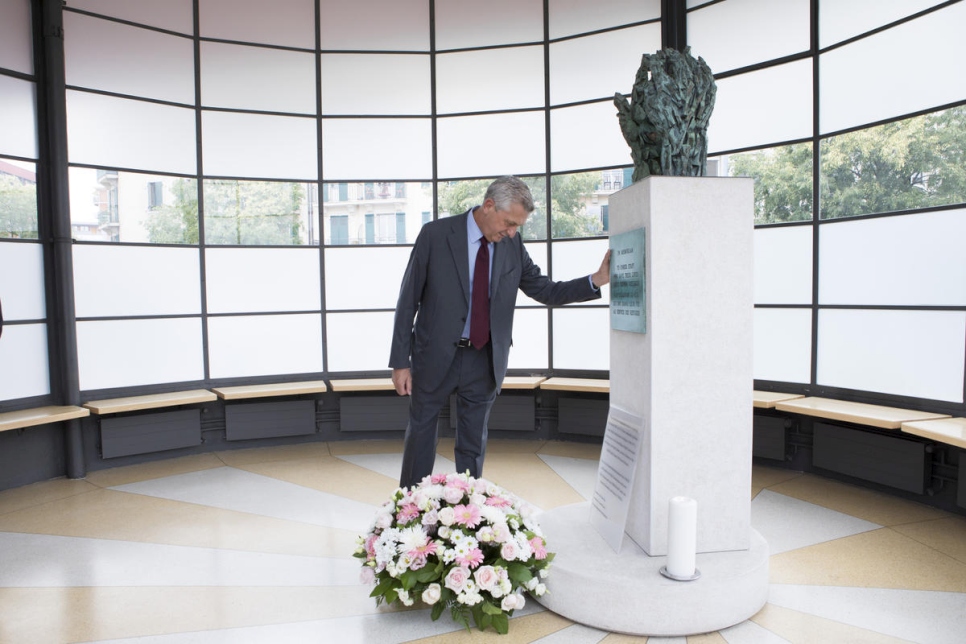UNHCR chief pays tribute to 'frontline' aid workers
Marking World Humanitarian Day, Filippo Grandi honours staff carrying out "crucial work" to aid those in greatest need in "some in the world's most dangerous places."

UN High Commissioner for Refugees, Filippo Grandi places flowers on the staff memorial at the UN Refugee Agency's headquarters in Geneva on World Humanitarian Day. © UNHCR/Susan Hopper
GENEVA – UN High Commissioner for Refugees Filippo Grandi today paid tribute to aid workers on the frontlines in the world’s most “difficult and dangerous places” where they routinely risk all to protect those in greatest need.
In an address to UNHCR staff in Geneva to mark World Humanitarian Day, Grandi emphasized the crucial work carried out by thousands of UNHCR, UN Refugee Agency, colleagues working in duty stations from Syria to South Sudan and the Democratic Republic of the Congo, or DRC.
“Many of our colleagues are on the frontlines doing our most crucial work … they are also the most exposed to acts of terror and violence, to war and conflict,” he said.
The risks routinely faced by humanitarians was evident in 2018, when an upsurge in major attacks worldwide claimed the lives of 131 aid workers. A further 144 aid workers were wounded in 226 separate attacks, and 131 kidnapped, with South Sudan, Syria, Afghanistan and the DRC the most severely affected operations.
There were 303 security incidents reported in 2018 involving UNHCR, and from January through June 2019 the number has been 190. No colleagues died in malicious incidents in the line of duty, but there were a number of serious incidents impacting UNHCR colleagues and our partners.
Grandi stressed that the very nature of UNHCR’s role protecting those in greatest need meant that 10,000 colleagues worked in hardship duty stations around the world, among them Yemen, Central African Republic, Burkina Faso and the countries bordering Venezuela.
“Two things are sure. One, this will not change… we are bound to be where refugees, displaced and other people of concern are. And two, we will continue to develop any possible measures to ensure we ... decrease the risk to all staff.”
“Many of our colleagues are on the frontlines doing our most crucial work."
In addition to the risks from violence, Grandi also highlighted the dangers field staff faced from epidemics. He mentioned eastern DRC where an outbreak of the frequently deadly Ebola virus has compounded the risks from insecurity.
The High Commissioner emphasized other unpredictable “hazards.” He made particular reference to the tragic loss of three UNHCR colleagues in the crash of Ethiopian Airlines Flight 302 on 10 March – Nadia Adam Abaker Ali, Jessica Hyba and Jackson Musoni.
World Humanitarian Day was established in 2008 by the United Nations General Assembly to honour the 22 aid workers who lost their lives in the bombing of the UN Headquarters in Baghdad in 2003. Among the fatal victims was a former senior UNHCR official, Sergio Vieira de Mello.
This year’s UN campaign for World Humanitarian Day celebrates #WomenHumanitarians and their tireless contribution to making the world a better place.
In his address to staff, the High Commissioner said more needed to be done to fight sexual harassment, which he called called “a grave form of insecurity in hardship and dangerous duty stations.”
Women make up 44 per cent of staff overall and 26 per cent of staff in hardship duty stations. Grandi said “much cultural change is needed to ensure that somehow we liberate emergency work from gender insensitive cultures – in more plain words, from ‘macho’ cultures … Much more has to be done in our responses.”
The High Commissioner led staff in a minute of silence at UNHCR’s headquarters and concluded the address by placing of a floral wreath at the staff memorial to honor the humanitarians who lost their lives while helping others in need.
“Today we remember sadly, respectfully, the colleagues who left us,” he said. “We recommit to doing everything possible to avoid further loss.”
